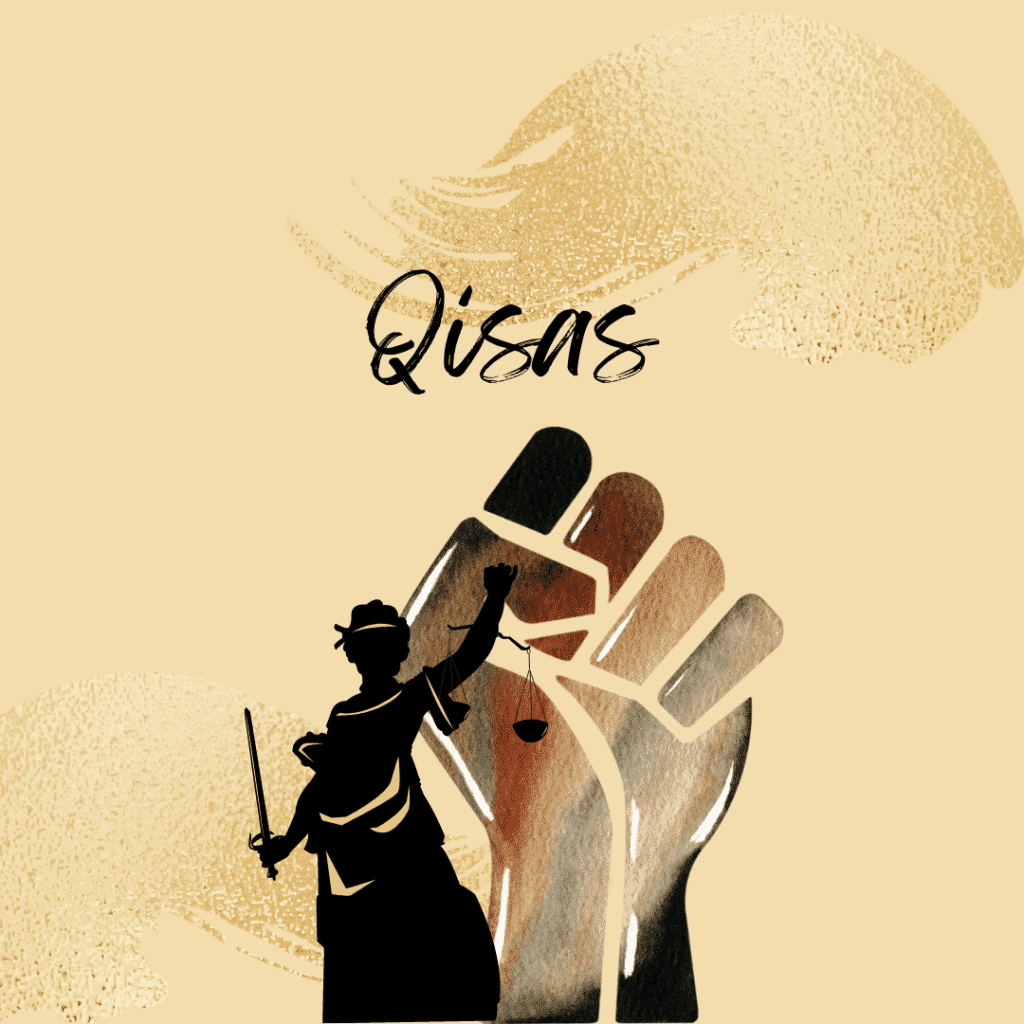The Quran is the primary source of Islamic law, and the rule of qisas is drawn from it. The term is used in the Quran to mean ‘equality.’ Learn more about it by looking at this topic.
Qisas
Qisas means “retaliation” and refers to the biblical precept of “an eye for an eye.”
The Islamic phrase qisas (Arabic) means revenge, akin to the biblical notion of an eye for an eye.
In the instance of murder, it refers to the right of a murder victim’s heirs to seek the murderer’s death.
“O you who believe, equivalence is the law decreed for you when dealing with murder – the free for the free, the enslaved person for the enslaved person, the female for the female. If the victim’s kin pardons one, an appreciative response is in order, and equitable compensation shall be paid. This is an alleviation from your Lord and mercy. Anyone who transgresses beyond this incurs a painful retribution.” — Sura 2, (Al-Baqarah) 178
The Quran, on the other hand, states that one should seek reparation (Diyya) rather than retaliation.
Because the state could only kill a murderer with the consent of the victim’s heirs, the state could only do so with their permission, and they were free to pardon the murderer as an act of charity or in exchange for restitution.
Is Qisas (The Law of Retaliation) in Conflict With Intellectual And Emotional Norms?

There is a group of people who, without thinking about it, have tried to critique sure of Islam’s criminal concerns, particularly the topic as’ (law of revenge), over which they have caused a lot of fuss, saying:
A killer’s crime is simply stealing a person’s life, but you’re doing the same thing with it!
Qisas is a spiteful and violent character.
This repulsive trait must be eradicated from the population by proper education; yet, advocates of it pump new life into this awful trait every day!
Murder is not a crime committed by healthy people; the killer almost certainly has a mental illness that must be addressed, and cannot help such people.
Issues of social order must evolve in tandem with society; therefore, rules enacted fourteen hundred years ago should not be applied in today’s culture!
Isn’t it better if the murders were put in jails, forced to work, and used for the good of society instead of it?
In this way, society would be shielded from their evils, but they might also be exploited to the entire degree feasible.
These are condensed summaries of the many concerns raised about this subject.
The solutions to these concerns can be found by studying verses in the Qur’an.
“And there is life for you in (the law of) retaliation, O men of understanding, that you may guard yourselves.” (2:179).
Does retribution preserve life?
Because removing hazardous persons is sometimes the most excellent choice for the growth of a community, and because that protect life, it may have been implanted as an instinct inside man.
Everything, whether it’s the medical system, agriculture, or animal husbandry, is founded on this rational principle:
The removal of a harmful and unpleasant creature.
We see that unhealthy parts of the body are amputated to safeguard the body and that dangerous and inconvenient branches are sawed away to ensure the growth of a plant.
Those who see the murderer’s death as a loss of another person only see it from their perspective; however, if they considered the wellbeing of the entire community and understood the role that qisas play in safeguarding and teaching all other people, their remarks would be reconsidered.
Objections
Eliminating such bloodsuckers from society is analogous to chopping off a dangerous limb or branch, which, according to reason, must be cut off.
Indeed, it must be remembered that no one has ever protested the amputation of a sick limb or a harmful branch until now.
This was in response to the initial objection.
In response to the second criticism, it is essential to recognize that alqisas law is unrelated to the question of vengefulness.
This is because retribution entails putting out the fires of rage that have erupted due to a personal situation.
Qisas, on the other hand, was enacted to prevent tyranny from recurring in society and seek justice for the community’s other innocent citizens.
To the third argument, that the killer must be suffering from a psychiatric disease and that ordinary people cannot commit such a crime, it must be replied that this speech is proper in some instances. Islam, too, has not imposed the law of Alqisas for a crazy killer or the like.
The Quran is the primary source of Islamic law, and the rule of qisas is drawn from it.
The term ‘Alqisas’ is used in the Quran to mean ‘equality.’
Practice at the moment

Several nations’ legal systems now provide Alqisas, including those that use classical/traditional Islamic jurisprudence (Saudi Arabia) or have passed qisas legislation as part of modern legal reforms.
Saudi Arabia is a country in the Middle East.
In Saudi Arabia, murder and manslaughter are private charges for which the victim or the victim’s heirs must prosecute, accept monetary compensation, or give pardon.
In Saudi Arabia, sharia courts use Qisas in juvenile cases.
The age restriction is rarely strictly enforced. A judge might consider a juvenile defendant’s physical attributes in determining whether or not they should be prosecuted as an adult.
In most circumstances, a person who meets at least one of the four criteria listed below is considered an adult for Qisas purposes:
you are over the age of 15, have wet dreams (al-Whitlam), have pubic hair, or are about to start menstruating.
When the Qisas concept is used in Saudi Arabia, the defendant will face equal reprisal and damage.
Conclusion
The ensuring of criminal justice, the safeguarding of societal safety, and the prohibition of personal revenge are all reasons for the permissibility of qisas.
Some argue that legislation enhances criminal justice by establishing a balance between offenses and punishments.
Furthermore, such a punishment acts as a deterrent to those who commit crimes, resulting in societal safety.
Finally, granting the victim or their family the right to that reprisal prevents them from pursuing their revenge.
Read More: Adam and eve children: Inferences about this story from the Holy Qur’an



